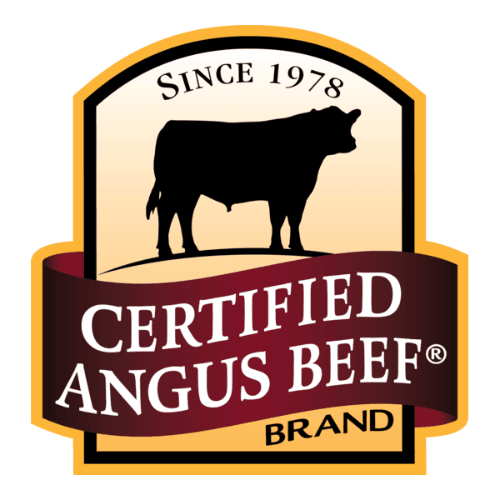
Certified Angus Beef
Nationwide Beef company owned by JBS
Reason: Close and unethical Trump Relationship
Certified Angus Beef is a high-visibility beef label found in supermarkets and restaurants nationwide, with production heavily tied to JBS, the world’s largest meat company. Through JBS’s industrial supply chain and lobbying power, the brand benefits from enormous reach and significant influence in U.S. food and agricultural policy.
Evidence & Context
Parent company: JBS
JBS S.A. is a Brazil-based meat conglomerate and one of the largest producers of beef, pork, and poultry in the world. Through its global network of slaughterhouses, feedlots, and processing plants – including U.S. subsidiaries like JBS USA – the company plays an outsized role in shaping food systems, labor conditions, and environmental outcomes on multiple continents.
JBS is not just a big meat company; it is a politically connected actor with a long record of corruption scandals, regulatory investigations, and environmental damage. Its recent multi-million-dollar donation to the Trump–Vance Inaugural Committee, combined with years of legal and ethical violations, makes it a textbook example of how concentrated corporate power can bend public policy and oversight in its favor.
Corruption, Bribery, and Criminal Settlements
JBS is controlled by the Batista family through J&F Investimentos. Over the last decade, the company and its owners have been at the center of one of the biggest corporate corruption scandals in Brazilian history. Executives admitted to paying bribes to scores of politicians and officials in exchange for favorable loans, contracts, and regulatory decisions. Brazilian plea agreements and reporting describe a years-long scheme in which bribery was treated as a cost of doing business.
In the United States, J&F Investimentos – the JBS holding company – pleaded guilty to Foreign Corrupt Practices Act (FCPA) charges for paying millions in bribes to Brazilian officials to secure financing and other advantages. As part of the resolution, J&F agreed to pay hundreds of millions of dollars in penalties to U.S. and Brazilian authorities.
These cases show a pattern: JBS built global scale not just through efficiency or innovation, but by repeatedly breaking the rules, falsifying its relationships with public officials, and treating fines as the price of political access.
Environmental Destruction and Deforestation
JBS is one of the companies most frequently linked to deforestation in the Amazon and other sensitive ecosystems. Investigations by NGOs and journalists have found that JBS has purchased cattle from ranches tied to illegal land clearing, land grabs, and violence against Indigenous communities, even after public “zero-deforestation” commitments.
Environmental groups tracking supply chains and finance have documented how JBS’s operations contribute to greenhouse gas emissions, biodiversity loss, and water contamination. For example, campaigns summarized by organizations like BankTrack and others highlight JBS as a high-risk actor for forests and climate because of its reliance on cattle raised in recently deforested regions and its poor record on traceability.
When JBS sought to list its shares on the New York Stock Exchange, environmental advocates raised alarms that U.S. investors would be underwriting ongoing deforestation and climate damage. The company moved forward anyway, using its political and financial muscle to secure the listing despite this opposition.
Trump–Vance Inaugural Donation and Regulatory Leverage
In 2025, JBS, through its U.S. operations, made a $5 million donation to the Trump–Vance Inaugural Committee — the largest single contribution to the fund. At the same time, the company was seeking approval to dual-list its stock on the New York Stock Exchange while facing U.S. antitrust and pricing investigations.
Senator Elizabeth Warren sent letters to JBS and its U.S. leadership demanding details on the donation and asking whether it was linked to the timing of regulatory approvals and enforcement decisions. Her office warned that the combination of:
- the record-setting inaugural contribution,
- active civil investigations into meat-pricing and farmer-pay practices, and
- the SEC’s approval of JBS’s long-sought NYSE listing
created the appearance of a “pay-to-play” relationship between the company and the Trump administration.
Agricultural media and watchdog outlets echoed these concerns, noting that JBS has repeatedly used political donations and lobbying to shape trade policy, tariffs, and enforcement in ways that favor large packers at the expense of workers, ranchers, and consumers.
Exploiting Workers and Rigging Markets
JBS has been implicated in antitrust cases alleging price-fixing and farmer underpayment, along with other major meat processors. U.S. lawsuits and settlements describe a system in which large packers coordinated prices, squeezed independent producers, and used opaque contracts to keep more value at the top of the supply chain.
During the COVID-19 pandemic, JBS plants became epicenters of outbreaks. Reporting and court documents across the meat industry describe how companies lobbied to keep plants running at maximum capacity even as workers died, arguing that meatpacking was “critical infrastructure.” JBS benefited from these decisions, while the people on the line absorbed the risk.
Why JBS Belongs on the Big Beautiful Boycott List
JBS’s business model depends on three pillars:
- Political capture: using donations, access, and lobbying — including a record inaugural gift during the Trump–Vance transition — to shape regulation and enforcement.
- Environmental extraction: profiting from deforestation, land conflicts, and high-emissions livestock systems while marketing itself as a “sustainable” global protein supplier.
- Market and labor abuse: consolidating power over farmers and workers through price-fixing schemes, opaque contracts, and unsafe working conditions.
Every dollar that flows to JBS — through beef, pork, or poultry under its many brands — helps fuel a corporation that trades in corruption, environmental destruction, and political influence. For anyone who cares about democracy, climate stability, and fair treatment of workers and producers, JBS is a company that should be firmly on the boycott list.
Contact
These are the public contact methods for this company. If you have thoughts, feedback, or concerns about their actions or policies, these are the channels they provide for hearing from the public.
Social
Addresses
- Headquarters206 Riffel Rd.Wooster, Ohio, 44691United States

